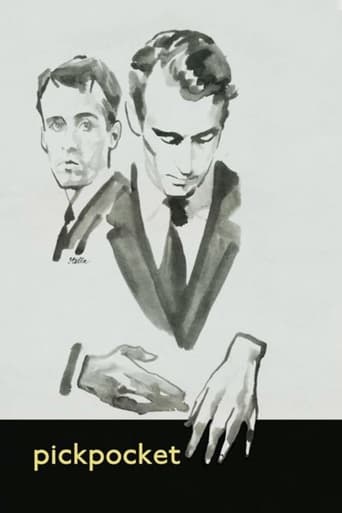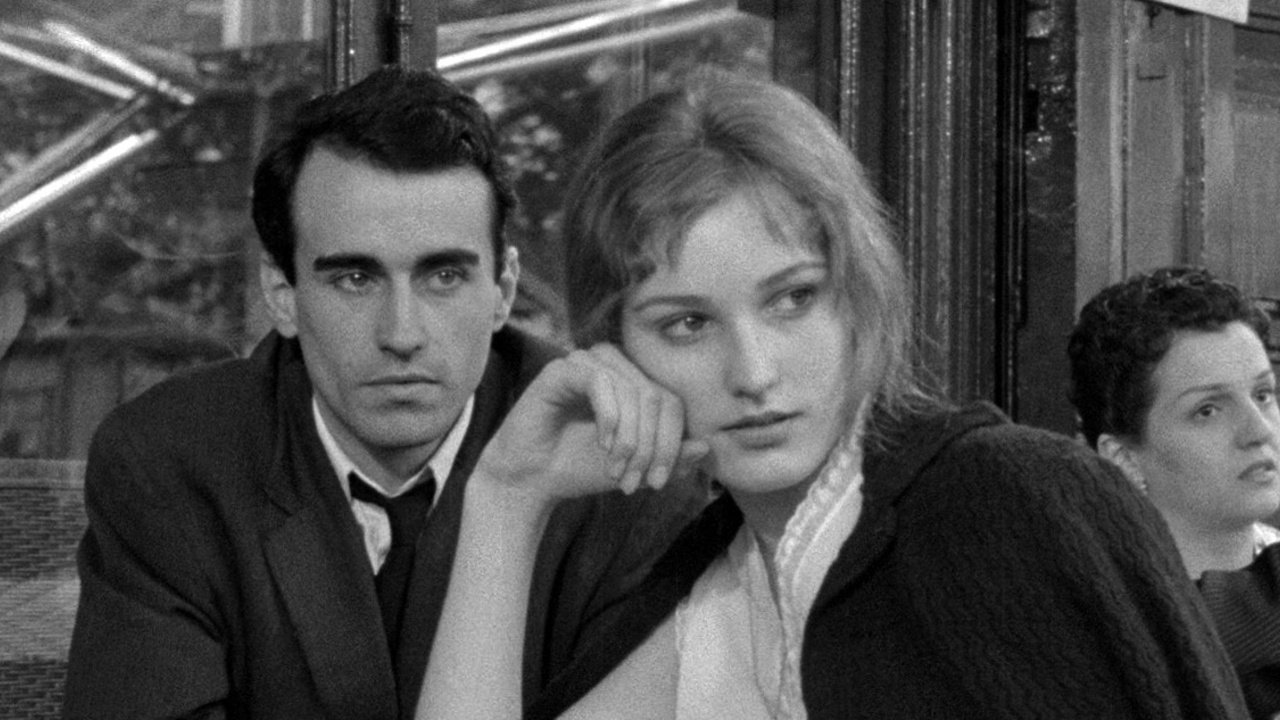Jack Banister
Barely coming in at 75 minutes, this movie is just so watchable! As Hitchcock said, the length of a film should be proportionate to the movie goers bladder! Well said and a film well done. If you've ever been to France (Paris in particular) you know that pickpockets are a problem and it is all too easy to become a victim. With some truly brilliant camera work and acting, we are shown by the main, Michel, the flip side of pick pocketing! I saw another review complaining about lack of a plot and I agree, it is frustrating! Just when you think he might give it up and go for love, he doesn't. All of the elements of the film NOT about pick pocketing are very wishy washy, but seriously...the title is pick pocketing...what did you expect?! The guy is happiest when he pick pockets and I am happiest when I watch him pick pocket! Truly a wonderful film.
Jackson Booth-Millard
From director Robert Bresson (Au Hasard Balthazar, L'Argent), the title of this film, featured in the book 1001 Movies You Must See Before You Die as the one of the entries, was distinctive and one that sounded worth watching, I was hoping for the best for this French film. Basically in Paris, France lives Michel (Martin LaSalle), a young man who finds an interest and a skill in picking pockets, i.e. slipping his fingers into or sneaking out wallets and purses from people's pockets. He is caught quickly the first time he does it a horse racing venue, but the Inspector (Jean Pélégri) released him because of lack of evidence, and he is allowed to take the money, and soon after this he becomes part of a group of pickpockets who teach him more skills. Michel visits his Mother (Dolly Scal), and he also meets Jeanne (Marika Green), who he begs to visit more often, and he gets the chance to get to know her better while on a date with his friend tagging Jacques (Pierre Leymarie) along, but he leaves this after he steals a watch at the carnival. He wants to clean up some of his guilt by visiting the Inspector and showing him a book he got about professional pickpocketing, but the police officer hardly glances at it, but he returns to his apartment and realises the Inspector was shunning him while he was there so that the police could search his apartment, but they failed to find the stolen stash of cash. Michel's Mother dies, and he attends the funeral with Jeanne, and after it the Inspector tells him that before she died she had some money stolen from her, he suspects her son did it, but he does not arrest him and he leaves the country to live an honest life without crime, but he throws all his money away spending on booze and women. Eventually Michel returns to France, and to Jeanne who he is shocked to find out mothered a child with Jacque but they did not marry and she has been left with nothing, so he starts working again to support her and the child, but he gives into temptation and is back to pickpocketing. In the end Michel is arrested and jailed with a confirmed theft by pickpocketing, and it is in prison that he realises with her regular visits that he does not truly love Jeanne. Also starring Kassagi as Accomplice, Pierre Étaix as Accomplice and César Gattegno as Detective. Leading actor LaSalle does well using hardly any facial expression at all to make an intriguing character that you unsure whether to be sympathetic or concerned for, I will admit first off that I sort of dozed or did not pay full attention to midway through, by I understood just about what was going on, and it was certainly an interesting enough crime drama. Very good!
kenjha
Bresson has taken elements from Dostoyevski's "Crime and Punishment" and Camus' "The Stranger," yet comes up with a film so dull and pointless that it's a chore to sit through it despite the short running time. The pickpocket scenes are so poorly executed that it's hard to believe that the victims would be so oblivious. The performances by actors making their film debuts range from dull to wooden. LaSalle is meant to be brooding as the protagonist, but he wears the same dour-faced expression throughout the film, making him about as interesting as a wet noodle. Green is quite lovely; LaSalle's lack of interest in her (until the contrived ending) is implausible.
Robert J. Maxwell
Some wag once suggested that civilization try to tap into the ontological Angst generated in the brain of Jean Paul Sartre and convert it into electrical energy. It would keep the City of Lights ablaze. Someone else suggested that France has three religions: Catholicism, Protestantism, and Atheism. I wonder if the two proposals aren't in some way congruent. Look at it this way. The whole purpose of religion is to keep you feeling guilty enough to support it. The Atheists don't have that kind of guilt, so they feel guilty about not having it. And all that existential spontaneity? Pure denial. Is it any wonder that Sartre bit his nails? I'd never seen any of Robert Bresson's work, though I'd often seen it referred to, and I was a little wary of watching this one. I thought it would turn out to be some highbrow allegory with no picking of pockets at all, just a mutual picking of equally gloomy minds, and all of it taking place in the rain.But actually, Michel LaSalle, is really a pickpocket. He's alienated from everyone else, lives alone in a crummy flat, visits his dying mother only reluctantly. He makes what I think is called a distant acquaintance of an alluring neighbor, Marika Green, who is tending Michel's mother out of compassion.Michel falls in with a couple of other pickpockets and there are several close ups of hands lifting wallets and unsnapping watches and slipping them into a confederate's pocket. The confederates aren't friends. They don't smile or laugh. Nobody laughs. They silently go about their routines, like the pod people in "Invasion of the Body Snatchers" or guests at a Seder hosted by Lutherans.Michel has already been caught once by the cops, who release him with a warning, but they continue to taunt him, following him around, trapping him finally at a race track. At one point, the Chief Inspector, Jean Pelegri, visits Michel and tells him the story of a boy who went bad. "Who was it?" "Why, it was you," replies the inspector.Well, Michel is a skinny, sensitive-looking young guy who tortures himself over his criminal acts, reads books, and he and his neighbors are very poor, and in other ways the endoskeleton of "Crime and Punishment" shows through the jailhouse pallor of the story. But that's okay.Still, all the way through, I kept trying to imagine how Michel, with no other source of income except what he picks off others in public, and what he earlier stole from his own mother, could subsist at all, especially after he starts having to split the take three ways with his two colleagues, about whom he knows nothing of importance. I mean, you can't WEAR half a dozen watches on your wrist. You have to hock them or fence them, right? And then you get ten centimes on the dollar? And how much can you make lifting wallets from strangers on the Metro, even if you're good at it? To prove it's a difficult way to make a living, I now extract my own wallet from my right rear trouser pocket (not from the easily picked breast pockets that Michel keeps sliding his fingertips in) and how much do I have? Let me see. Eighty-two dollars! Wait a minute. Is this somebody ELSE'S wallet? Nope. Wow. Must have cashed a big check lately. You'll have to take my word for it that the usual amount only infrequently runs to double digits.The Introduction tells us that this movie is not a policier (which the subtitles translate as "thriller") but a story of two souls finding each other. One soul, of course, is Michel. The other is Marika Green as Jeanne. Now, Marika Green has the face -- the cherubic lips and large bright eyes -- of one of those old-fashioned dolls made of porcelain. Any man would happily throw himself at her feet and grovel, though I'm not sure about Michel. But, boy, if this romance is supposed to be the heart of the story, it is very clumsily handled. It's anything but organic. The two have exchanged only a few words before, and I don't think they've ever touched, yet at the end they go into a clinch and there is a big smooch. Maybe it's an existential act.Anyway, if I tried hard enough, I could find plenty of covert messages behind this slow, dullish, and rather uninvolving movie. But I'd never be sure I wasn't committing the Texas sharpshooter fallacy, seeing clusters of meaning where none exist.In an introduction to the Criterion Edition, Paul Schrader lauds the film because it violates the viewer's expectations regarding editing, plot, facial expressions, emotional involvement, and so forth. The usual movie conventions are discarded. He must have loved Andy Warhol's "Empire", which is a single shot of the Empire State Building from early evening until nearly 3 am the next day, more than eight hours long. That'll violate your expectations for you.Worth watching once, if only because it's widely recognized as an important film.


 AD
AD




